精品翻译欣赏
- 格式:doc
- 大小:46.00 KB
- 文档页数:6
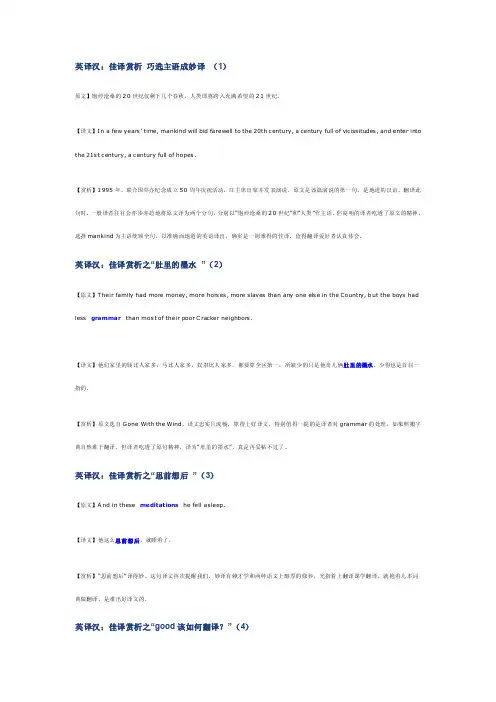
英译汉:佳译赏析巧选主语成妙译(1)原文】饱经沧桑的20世纪仅剩下几个春秋,人类即将跨入充满希望的21世纪。
【译文】I n a few years’ time, mankind will bid farewell to the 20th c entury, a century full of vic issitudes, and enter into the 21s t c entury, a c entury full of hopes.【赏析】1995年,联合国举办纪念成立50周年庆祝活动,江主席出席并发表演说。
原文是该篇演说的第一句,是地道的汉语。
翻译此句时,一般译者往往会亦步亦趋地将原文译为两个分句,分别以“饱经沧桑的20世纪”和“人类”作主语。
但高明的译者吃透了原文的精神,选择mankind为主语统领全句,以准确而地道的英语译出,确实是一则难得的佳译,值得翻译爱好者认真体会。
英译汉:佳译赏析之“肚里的墨水”(2)【原文】T heir family had more money, more hors es, more slaves than any one els e in the Country, b ut the boys had less grammar than mos t of their poor C racker neighbors.【译文】他们家里的钱比人家多,马比人家多,奴隶比人家多,都要算全区第一,所缺少的只是他哥儿俩肚里的墨水,少得也是首屈一指的。
【赏析】原文选自Gone With the Wind。
译文忠实且流畅,算得上好译文,特别值得一提的是译者对grammar的处理,如果照搬字典自然难于翻译,但译者吃透了原句精神,译为“肚里的墨水”,真是再妥帖不过了。
英译汉:佳译赏析之“思前想后”(3)【原文】A nd in these meditations he fell asleep.【译文】他这么思前想后,就睡着了。
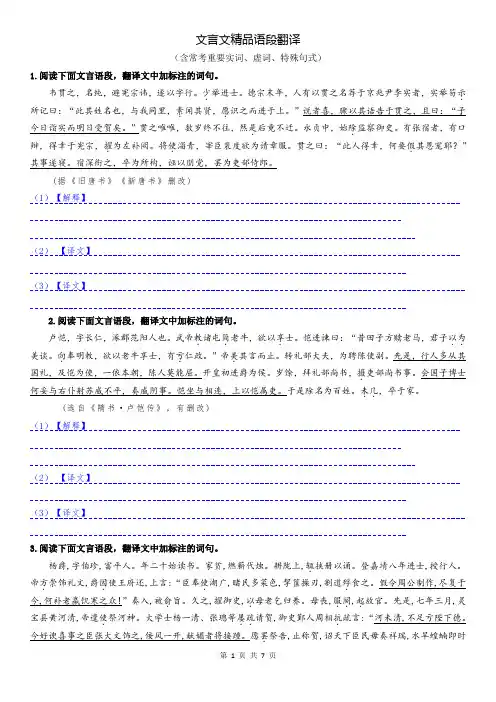
文言文精品语段翻译(含常考重要实词、虚词、特殊句式)1.阅读下面文言语段,翻译文中加标注的词句。
韦贯之,名纯,避宪宗讳,遂以字行。
少.举进士。
德宗末年,人有以贯之名荐于京兆尹李实者,实举笏示.所记曰:“此其姓名也,与我同里,素.闻其贤,愿.识之而进于上。
”说者喜,骤以其语告于贯之,且曰:“子今日诣实而明日受贺矣。
”贯之唯唯,数岁终不往,然是.后竟不迁。
永贞中,始除.监察御史。
有张宿者,有口辩,得幸于宪宗,擢.为左补阙。
将使.淄青,宰臣裴度欲为请章服。
贯之曰:“此人得幸,何要假.其恩宠耶?”其事遂寝。
宿深衔之,卒为所构,诬以朋党,罢为吏部侍郎。
(据《旧唐书》《新唐书》删改)(1)【解释】(2)【译文】(3)【译文】2.阅读下面文言语段,翻译文中加标注的词句。
卢恺,字长仁,涿郡范阳人也。
武帝敕.诸屯简.老牛,欲以享.士。
恺进谏曰:“昔田子方赎老马,君子以为..美谈。
向.奉明敕,欲以老牛享士,有亏.仁政。
”帝美.其言而止。
转礼部大夫,为聘陈使副。
先是,行人多从其国礼,及恺为使,一依本朝,陈人莫能屈。
开皇初进爵为侯。
岁馀,拜礼部尚书,摄.吏部尚书事。
会国子博士何妥与右仆射苏威不平,奏威阴事。
恺坐与相连,上以恺属吏。
于是除名为百姓。
未几..,卒于家。
(选自《隋书·卢恺传》,有删改)(1)【解释】(2)【译文】(3)【译文】3.阅读下面文言语段,翻译文中加标注的词句。
杨爵,字伯珍,富平人。
年二十始读书。
家贫,燃薪代烛。
耕陇上,辄.挟册以诵。
登嘉靖八年进士,授行人。
帝方.崇饰礼文,爵因.使王府还,上言:“臣奉使.湖广,睹民多菜色,挈筐操刃,割道殍.食之。
假令周公制作,尽复于今,何补老羸饥寒之众!”奏入,被俞.旨。
久之,擢御史,以.母老乞归养。
母丧,服阕..,起.故官。
先是,七年三月,灵宝县黄河清,帝遣使.祭河神。
大学士杨一清、张璁等屡疏..请贺,御史鄞人周相抗.疏言:“河未清,不足亏陛下德。
今好谀喜事之臣张大文饰之,佞风一开,献媚者将接踵。
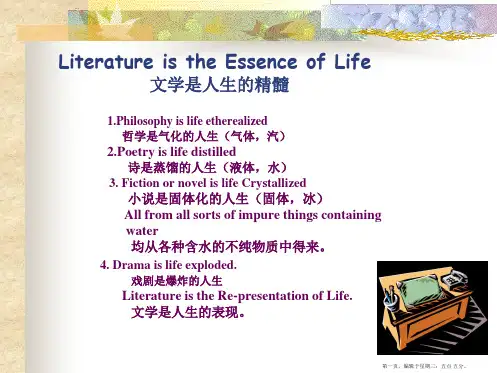
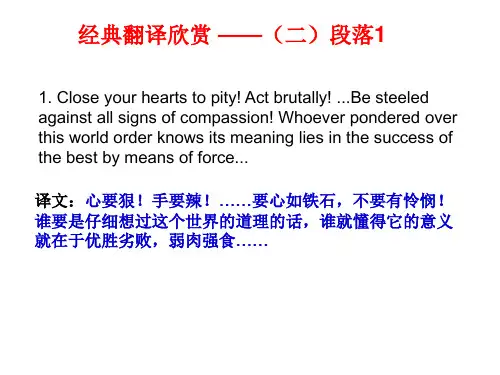
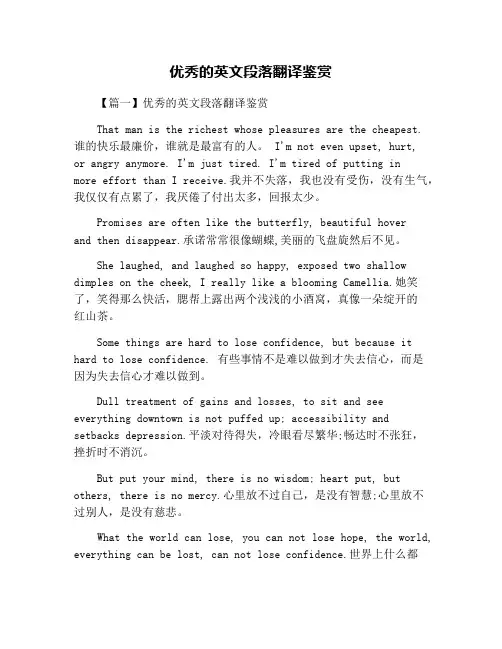
优秀的英文段落翻译鉴赏【篇一】优秀的英文段落翻译鉴赏That man is the richest whose pleasures are the cheapest.谁的快乐最廉价,谁就是最富有的人。
I'm not even upset, hurt,or angry anymore. I'm just tired. I'm tired of putting inmore effort than I receive.我并不失落,我也没有受伤,没有生气,我仅仅有点累了,我厌倦了付出太多,回报太少。
Promises are often like the butterfly, beautiful hoverand then disappear.承诺常常很像蝴蝶,美丽的飞盘旋然后不见。
She laughed, and laughed so happy, exposed two shallow dimples on the cheek, I really like a blooming Camellia.她笑了,笑得那么快活,腮帮上露出两个浅浅的小酒窝,真像一朵绽开的红山茶。
Some things are hard to lose confidence, but because it hard to lose confidence. 有些事情不是难以做到才失去信心,而是因为失去信心才难以做到。
Dull treatment of gains and losses, to sit and see everything downtown is not puffed up; accessibility and setbacks depression.平淡对待得失,冷眼看尽繁华;畅达时不张狂,挫折时不消沉。
But put your mind, there is no wisdom; heart put, but others, there is no mercy.心里放不过自己,是没有智慧;心里放不过别人,是没有慈悲。
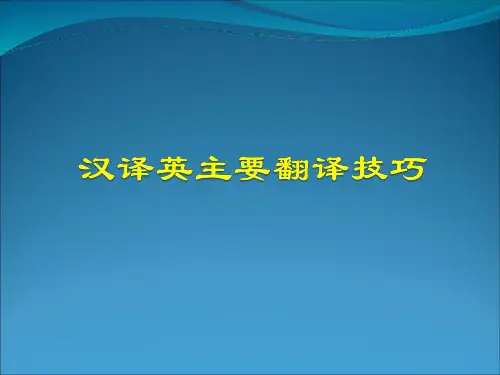
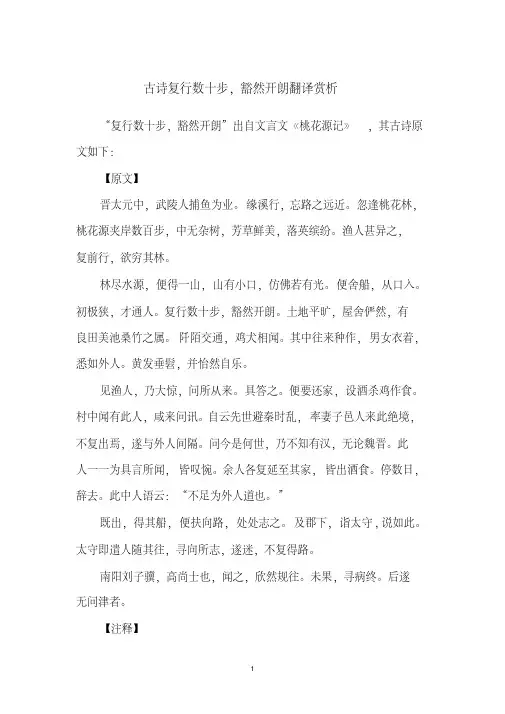
古诗复行数十步,豁然开朗翻译赏析“复行数十步,豁然开朗”出自文言文《桃花源记》,其古诗原文如下:【原文】晋太元中,武陵人捕鱼为业。
缘溪行,忘路之远近。
忽逢桃花林,桃花源夹岸数百步,中无杂树,芳草鲜美,落英缤纷。
渔人甚异之,复前行,欲穷其林。
林尽水源,便得一山,山有小口,仿佛若有光。
便舍船,从口入。
初极狭,才通人。
复行数十步,豁然开朗。
土地平旷,屋舍俨然,有良田美池桑竹之属。
阡陌交通,鸡犬相闻。
其中往来种作,男女衣着,悉如外人。
黄发垂髫,并怡然自乐。
见渔人,乃大惊,问所从来。
具答之。
便要还家,设酒杀鸡作食。
村中闻有此人,咸来问讯。
自云先世避秦时乱,率妻子邑人来此绝境,不复出焉,遂与外人间隔。
问今是何世,乃不知有汉,无论魏晋。
此人一一为具言所闻,皆叹惋。
余人各复延至其家,皆出酒食。
停数日,辞去。
此中人语云:“不足为外人道也。
”既出,得其船,便扶向路,处处志之。
及郡下,诣太守,说如此。
太守即遣人随其往,寻向所志,遂迷,不复得路。
南阳刘子骥,高尚士也,闻之,欣然规往。
未果,寻病终。
后遂无问津者。
【注释】1太元:东晋孝武帝的年号(376-397年)。
2武陵:郡名,今武陵山区或湖南常德一带。
3为业:把……作为职业,以……为生。
为,作为。
4缘:顺着、沿着。
5行:行走这里指划船。
6远近:偏义复词,仅指远。
7忽逢:忽然遇到。
逢,遇见。
8夹岸:两岸。
9杂:别的,其他的。
10鲜美:鲜艳美丽。
11落英:落花。
一说,初开的花。
12缤纷:繁多而纷乱的样子。
13异之:以之为异,即对此感到诧异。
异,意动用法,形作动,以······为异,对······感到诧异,认为······是奇异的。
之,代词,指见到的景象。
14复:又,再。
15前:名词活用为状语,向前。
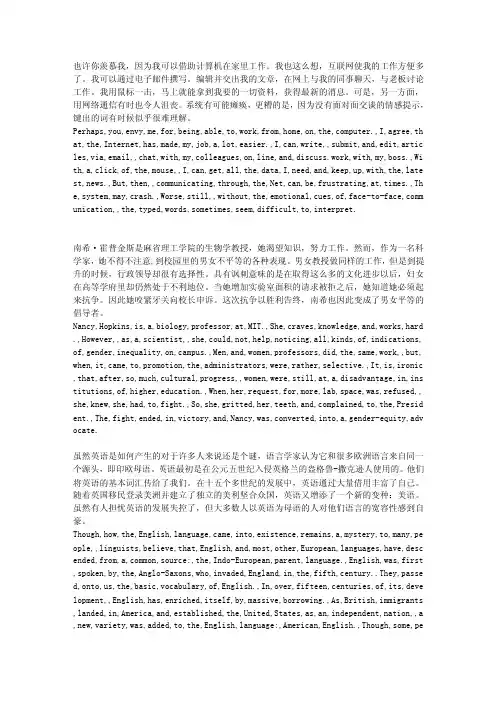
也许你羡慕我,因为我可以借助计算机在家里工作。
我也这么想,互联网使我的工作方便多了。
我可以通过电子邮件撰写。
编辑并交出我的文章,在网上与我的同事聊天,与老板讨论工作。
我用鼠标一击,马上就能拿到我要的一切资料,获得最新的消息。
可是,另一方面,用网络通信有时也令人沮丧。
系统有可能瘫痪,更糟的是,因为没有面对面交谈的情感提示,键出的词有时候似乎很难理解。
Perhaps,you,envy,me,for,being,able,to,work,from,home,on,the,computer.,I,agree,th at,the,Internet,has,made,my,job,a,lot,easier.,I,can,write,,submit,and,edit,artic les,via,email,,chat,with,my,colleagues,on,line,and,discuss,work,with,my,boss.,Wi th,a,click,of,the,mouse,,I,can,get,all,the,data,I,need,and,keep,up,with,the,late st,news.,But,then,,communicating,through,the,Net,can,be,frustrating,at,times.,Th e,system,may,crash.,Worse,still,,without,the,emotional,cues,of,face-to-face,comm unication,,the,typed,words,sometimes,seem,difficult,to,interpret.南希·霍普金斯是麻省理工学院的生物学教授,她渴望知识,努力工作。
然而,作为一名科学家,她不得不注意,到校园里的男女不平等的各种表现。
男女教授做同样的工作,但是到提升的时候,行政领导却很有选择性。
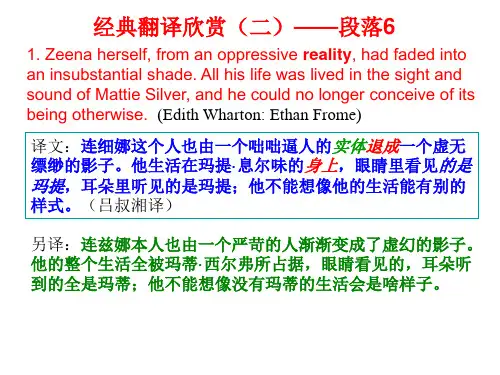
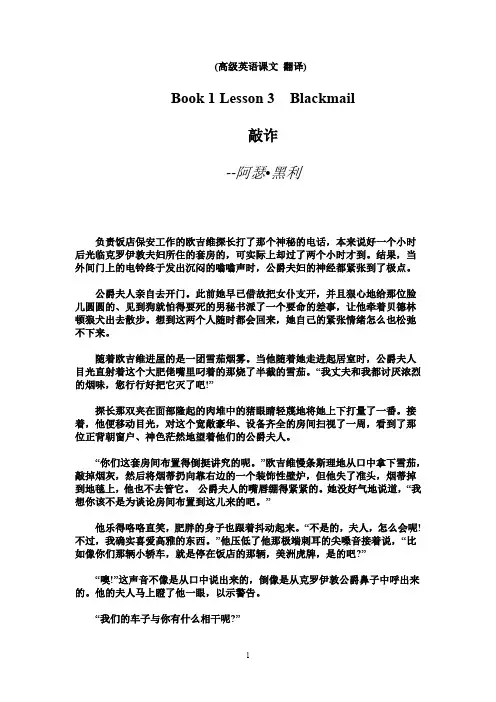
(高级英语课文翻译)Book 1 Lesson 3 Blackmail敲诈--阿瑟•黑利负责饭店保安工作的欧吉维探长打了那个神秘的电话,本来说好一个小时后光临克罗伊敦夫妇所住的套房的,可实际上却过了两个小时才到。
结果,当外间门上的电铃终于发出沉闷的嗡嗡声时,公爵夫妇的神经都紧张到了极点。
公爵夫人亲自去开门。
此前她早已借故把女仆支开,并且狠心地给那位脸儿圆圆的、见到狗就怕得要死的男秘书派了一个要命的差事,让他牵着贝德林顿狼犬出去散步。
想到这两个人随时都会回来,她自己的紧张情绪怎么也松弛不下来。
随着欧吉维进屋的是一团雪茄烟雾。
当他随着她走进起居室时,公爵夫人目光直射着这个大肥佬嘴里叼着的那烧了半截的雪茄。
“我丈夫和我都讨厌浓烈的烟味,您行行好把它灭了吧!”探长那双夹在面部隆起的肉堆中的猪眼睛轻蔑地将她上下打量了一番。
接着,他便移动目光,对这个宽敞豪华、设备齐全的房间扫视了一周,看到了那位正背朝窗户、神色茫然地望着他们的公爵夫人。
“你们这套房间布置得倒挺讲究的呢。
”欧吉维慢条斯理地从口中拿下雪茄,敲掉烟灰,然后将烟蒂扔向靠右边的一个装饰性壁炉,但他失了准头,烟蒂掉到地毯上,他也不去管它。
公爵夫人的嘴唇绷得紧紧的。
她没好气地说道,“我想你该不是为谈论房间布置到这儿来的吧。
”他乐得咯咯直笑,肥胖的身子也跟着抖动起来。
“不是的,夫人,怎么会呢!不过,我确实喜爱高雅的东西。
”他压低了他那极端刺耳的尖嗓音接着说,“比如像你们那辆小轿车,就是停在饭店的那辆,美洲虎牌,是的吧?”“噢!”这声音不像是从口中说出来的,倒像是从克罗伊敦公爵鼻子中呼出来的。
他的夫人马上瞪了他一眼,以示警告。
“我们的车子与你有什么相干呢?”公爵夫人的这句问话似乎是个信号,一听到这个信号,探长的态度马上就变了。
他猝然问道,“这儿还有别的人么?”公爵回答道,“没有。
我们早把他们都打发出去了。
”“还是检查一下的好。
”这个大胖子以敏捷得出奇的动作对整个套房前前后后地巡查了一遍,凡是有门的地方就打开往里看看。
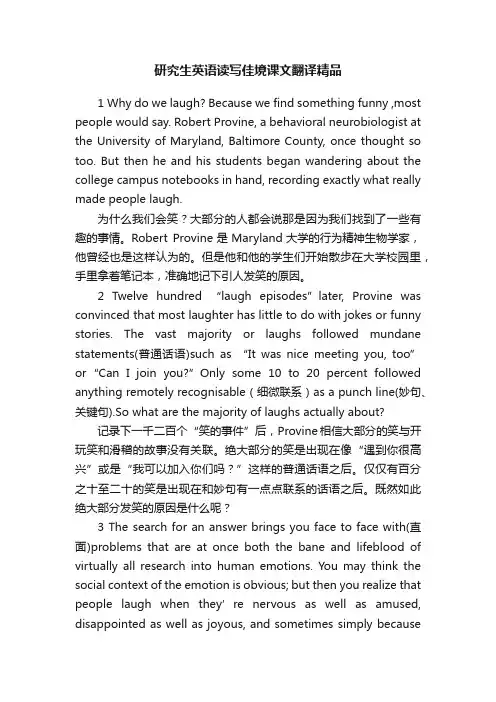
研究生英语读写佳境课文翻译精品1 Why do we laugh? Because we find something funny ,most people would say. Robert Provine, a behavioral neurobiologist at the University of Maryland, Baltimore County, once thought so too. But then he and his students began wandering about the college campus notebooks in hand, recording exactly what really made people laugh.为什么我们会笑?大部分的人都会说那是因为我们找到了一些有趣的事情。
Robert Provine是Maryland大学的行为精神生物学家,他曾经也是这样认为的。
但是他和他的学生们开始散步在大学校园里,手里拿着笔记本,准确地记下引人发笑的原因。
2 Twelve hundred “laugh episodes”later, Provine was convinced that most laughter has little to do with jokes or funny stories. The vast majority or laughs followed mundane statements(普通话语)such as “It was nice meeting you, too” or“Can I join you?”Only some 10 to 20 percent followed anything remotely recognisable(细微联系)as a punch line(妙句、关键句).So what are the majority of laughs actually about?记录下一千二百个“笑的事件”后,Provine相信大部分的笑与开玩笑和滑稽的故事没有关联。
1.温故而知新,可以为师矣。
If a man keeps cherishing his old knowledge, so as continually to be acquiringnew, he may be a teacher of others.2.学而不思则罔,思而不学则殆。
Learning without thought is labour lost; thought without learning isperilous. 3.敏而好学,不耻下问。
He was of an active nature and yet fond of learning, and he was not ashamed to askand learn of his inferiors.4.知之者,不如好之者,好之者,不如乐之者。
They who know the truth are not equal to those who loveit, and they who love it are not equal to those who delight in it.5.默而识之,学而不厌,诲人不倦,何有于我哉。
The silent treasuring up of knowledge; learning withoutsatiety; and instructing others without being wearied -- which one of these things belongs to me? 6.三人行,必有我师焉。
择其善者而从之,其不善者而改之。
When I walk along with two others, theymay serve me as my teachers. I will select their good qualities and follow them, their bad qualities and avoidthem. 7.子曰:“知之者不如好之者,好之者不如乐之者。
6.丛林短裤1. 这是星期五的下午,3班的学生们已经穿好了外套,排成一队等着回家。
兰尼站在队尾因为他的防水服的拉链卡住了,他忙着弄拉链,几乎没听到老师考克斯先生说了什么。
“这是给大家的一封信”考克斯先生说“别弄丢了,一定要交给你们的父母,里面有好消息的”。
兰尼很想知道这个好消息是什么,他匆忙跑过了操场,找到了妈妈。
“快,打开这封信”兰尼说“考克斯先生说这里面有好消息”“要先跟我打招呼”妈妈笑着说。
但是她还是打开了信,读完了信她告诉兰尼,“下周3班要上一节足球课,学校会借给你们足球鞋”“哇呜,”兰尼大叫“真正的足球鞋,我敢说我一定能进15个球”她妈妈把信放进了包里“条纹衫和短袜怎么样?我能有一件真正的球服吗”兰尼恳求道“等等看吧”妈妈说到了家里,兰尼还是脱不下他的防水服,他妈妈不得不去帮他。
“我很高兴你没有弄坏拉链,在下个月之前我没法给你再弄件衣服”她说。
“我不想要新外套”兰尼说“但是我能有一件新足球服吗,求你了”“喝完茶再问我”他妈妈说。
他们的茶点吃了带果酱和苹果的薄饼。
薄饼是兰尼最爱吃的。
可是,今天他以最快的速度吃完了它。
他卡它一声放下了刀和叉。
“你答应我吃完茶点就说足球的事”妈妈从包里拿出了考克斯先生的信。
“每个孩子将会需要一件旧T恤和一些袜子”她读道“不是真正的足球用品吗?”兰尼问道“很抱歉,没有。
除了短裤。
考克斯先生想让你们都穿上新短裤。
我们明天就去市场买”兰尼很不高兴,但是他知道他妈妈,她一旦下定决心就不会更改了。
他看上去很**“我敢打赌他们都有象样的足球服”他想“我敢打赌他们都没有穿旧T恤”那个夜晚,他躺着睡不着一直在想,他要确保他妈妈买足球短裤。
他想要双合适的白色足球短裤。
然后,他知道他能进好多的球。
2.第二天早上吃过早饭,他们出发去买新短裤。
市场离兰尼住的地方隔两条街。
在路上,他们看到3班的泰德和肖恩。
泰德和肖恩住在兰尼家附近,他们正在马路的里面把球踢来踢去。
肖恩猛地把球拍向他,兰尼把球踢了回去。
精品翻译欣赏THREE DAYS TO SEEHelen KellerAll of us have read thrilling stories in which the hero had only a limited and specified time to live. Sometimes as short as twenty four hours. But always we were interested in discovering just how the doomed man chose to spend his last days or his last hours. I speak, of course, of free man who have a choice, not condemned criminals whose sphere of activities is strictly delimited. Such stories set us thinking, wondering what we should do under similar circumstances. What events, what experiences, what associations should we crowd into those last hours as mortal beings? What happiness should we find in reviewing the past, what regrets?Sometimes I have thought it would be an excellent rule to live each day as if we should die tomorrow. Such an attitude would emphasize sharply the values of life. We should live each day with a gentleness, a vigor, and a keenness of appreciation which are often lost when time stretches before us in the constant panorama of more days and months and years to come. There are those, of course, who would adopt the epicurean motto of 'Eat, drink, and be merry, ' but most people would be chastened by the certainty of impending death.Most of us, however, take life for granted. We know that one day we must die, but usually we picture that day as far in the future. When we are in buoyant health, death is all but unimaginable. We seldom think of it. The days stretch out in an endless vista. So we go about our petty tasks, hardly aware of our listless attitude toward life.The same lethargy, I am afraid, characterizes the use of all our faculties and senses. Only the deaf appreciate hearing, only the blind realize the manifold blessings that lie in sight. Particularly does this observation apply to those who have lost sight and hearing in adult life. But those who have never suffered impairment of sight or hearing seldom make the fullest use of these blessed faculties. Their eyes and ears take in all sights and sounds hazily, without concentration, and with little appreciation. It is the same old story of not being grateful for what we have until we lose it, of not being conscious of health until we are ill.I have often thought it would be a blessing if each human being were stricken blind and deaf for a few days at some time during his early adult life. Darkness would make him more appreciative of sight; silence would teach him the joys of sound.At times my heart cries out with longing to see all these things. If I can get so much pleasure from mere touch, how much more beauty must be revealed by sight. Yet, those who have eyes apparently see little. The panorama of color and action which fills the world is taken for granted. It is human, perhaps, to appreciate little that which we have and to long for that which we have not, but it is a great pity that in the would of light the gift of sight is used only as a mere convenience rather than as a means of adding fullness to life.Oh, the things that I should see if I had the power of sight for just three days.给我三天光明海伦·凯勒我们大家都读过一些激动人心的故事,故事中的主人公将不久于人世,余下的日子屈指可数,长不过一年,短则只有一天。
我们总想知道临头的人作出什么样的抉择来度过最后的命数。
我当然不是那些活动范围受到严格限制的死囚,而是可以自由选择的人。
这类故事引起我们思索和遐想:在类似情况下,我们会做些什么呢?哪些事件、哪些经历、哪些联想会在临死前的最后时刻一股脑儿涌向心头呢?当我们回首往事时,又有哪些欣慰或悔恨之感呢?有时我想,把每一天都当作生命的最后一天来过,也许是一种极好的生活准则。
这种态度会使生命的价值印章有突出,使我们以优雅的风度、旺盛的精力和高度珍异的心情度过每一天;而当我们觉得岁月延绵不断,来日方长时,往往失掉这种态度。
当然,有人会因而奉行亨乐主义的信条,一味吃喝玩乐,但更多的人却因为行将就木而变得严肃纯洁。
我们大多数人把生命视若等闲。
只有聋子才珍惜听觉,只有盲人才领悟光明所赐给人们的难以计数地幸福。
成年时未受到损伤的人却很少运用他们的天赋。
他们视而不见,充耳不闻,对其所闻漫不经心,毫无鉴赏珍惜之意。
事情往往是这样,失却之物,方知珍惜;生了病才知道健康之可贵。
我时常在想,倘若让每一个人在刚刚成年的某个时期尝一点苦头,瞎几天,聋几天,恐怕颇有裨益。
黑暗会使人更加珍惜光明,寂静会告诉人们听到声音时的欢乐。
我的心时时在呐喊,渴望看见所有这一切。
既然仅凭触觉我就能得到这许多欢乐,那么视觉向我展示的美景不更多得不可胜数了吗?可是,明眼人显然徙有两只眼睛,充满着大千世界的丰富多采、千姿百态的画景,在他们看来竟是平淡无奇。
有了的东西不加珍惜,没有的东西却一味追求,这也许是人之常情。
然而,在这个光明的世界上,天赋的视觉地仅仅被当作一种方便的条件,而不是用来充实生活,这毕竟是极大的憾事。
哦,倘若给我光明,哪怕仅仅三天,我将能看到多少东西啊!On Visiting BookshopsTime spent in a bookshop can be most enjoyable. whether you are a book-lover or merely there to buy a book as a present. You may even have entered the shop just to find shelter from a sudden shower. Whatever the reason, you can soon become totally unaware of your surroundings. The desire to pick up a book with an attractive dust-jacket is irresistible, although this method of selection ought not to be followed, as you might end up with a rather dull book. You soon become absorbed in some book or other, and usually it is only much later that you realize you have spent far too much time there and must dash off to keep some forgotten appointment—without buying a book, of course.This opportunity to escape the realities of everyday life is, perhaps, the main attraction of a bookshop. There are not many places where it is possible to do this. A music shop is very much like a bookshop. You can wander round such places to your heart's content. If it is a good shop, no assistant will approach you with the inevitable greeting:”Can I help you, sir?” You needn't buy anything you don't want. In a bookshop an assistant should remain in the background until you have finished browsing. Then, and only then, are his services necessary. Of course, you may want to find out where a particular section is ,but when he has led you there, the assistant should goaway politely and look as if he is not interested in selling a single book.You have to be careful not to be attracted by the variety of books in a bookshop. It is very easy to enter the shop looking for a book on, say, ancient coins and to come out carrying a book about modern weapons—something which has only vaguely interested you up till then. This volume on the subject, however, happened to be so well illustrated and the part of the text you read proved so interesting, that you just had to buy it. This sort of thing can be very dangerous. Apart from running up a huge account, you can waste a great deal of time wandering room section to section. Booksellers must be both long-suffering and indulgent.There is a story which can illustrate this. A medical student had to read a text-book which was far too expensive for him to buy. He couldn t obtain it from the library and the only copy he could find was in his bookshop. Every afternoon, therefore, he would go along to the shop and read a little of the book at a time. One day, however, he was dismayed to find the book missing from its usual place and was about to leave when he noticed the owner of the shop beckoning to him. Expecting to be told off, he went towards him. To his surprise, the owner pointed to the book, which was tucked away in a corner. “I put it there in case anyone was tempted to buy it.” he said, and left the delighted student to continue his reading.Bookshops are worth visiting indeed, if you spend your time and money wisely there.论逛书店无论你是一个书迷,还是单纯为了买本书作为礼物,甚至你只是为了躲避突如其来的阵雨而进入书店,在书店里度过的时间是十分富有情趣的。